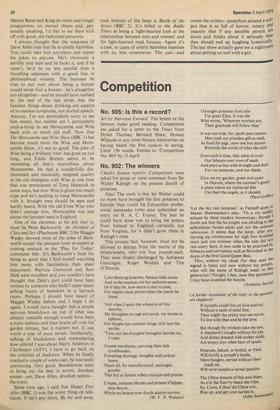No. 902: The winners Charles Seaton reports: Competitors were asked
for prose or verse comment from Sir Walter Raleigh on the present dearth of potatoes.
Alas! The truth is that Sir Walter could no more have brought the first potatoes to Europe than could his Edwardian profes- sorial namesake (who also submitted an entry via H. A. C. Evans). The best he could have done was to bring the potato from Ireland to England—certainly not from Virginia, for it didn't grow there in Raleigh's time.
This prosaic fact, however, must not be allowed to detract from the merits of the prizewinners, who win four pounds each. They were closely challenged by Adrienne Gascoigne, Roger Wodd is and Tim O'Dowda.
Lyke fleetyng dreames, batatas fade awaie And in the markets are but seldome seene, Or if they be, how deare is ther to paie, For rogues rayse pryces when the yeeres be
leane.
Yett when I seeke the wherefor of this dearthe, My thoughtes to rage are turnd, my minde to spleene, For thoghe last svmmer longe, drie laye the earthe, 'Twas not the droughte broughte famine nie, I ween.
Greate merchants, carvying their rich lyvelihoodes, Forseeing shortage, boughte with ardour keene Neare all, for manufactourd, packaged goodes That but as honest tubers masque and preene.
Crispes, instante Mushe and procest Chippes thus thryve, Whyle tru batata now douth scairce survive.
(W. F. N. Watson) I brought potatoes from afar For great Eliza. It was she Who wrote, 'Wherever mortals are, Their gratitude will follow thee.'
It was not true, for, spoilt past reason, Men took my priceless gift as read, As food for pigs; now one hot season
Reminds the world of what she said.
Even such is time, that takes in trust
Our labours over rows of seeds And pays us but with drought and dust For our potatoes, and our deeds.
Give me my garden, green and quiet In Heaven, where the summer's good: A place where my immortal diet Can feed the angels, as it should. (Paul Griffin)
'Let the sky rain potatoes', as Falstaff sayeS in Master Shakespeare's play. `Tis a cry saddlY echoed by these modern hovsewiues; though I dovbt not that the fat knight was allvding to the aphrodisiac batata edulis and not the solantnn tuberosum. It seems that the latter, after svP tayning my covntrymen for nigh fovr hvndred years and one svmmer when, the rain did not rain euery daye, is now onlie to be procvred by briberye and corrvption svch as flovrshed in the dayes of the first Good Queen Bess. Thvs, withovt my cloak (for they saye the legend is false) and now withovt my potato, what will the name of Raleigh mean to this generation? Navght, I fear, saue that perchance I may haue inuented the bicycle.
(Anthony Jarvis)
(A further instalment of the reply to the passion- ate shepherd) If nymphs could live on love and air, Without a taste of solid fare,
Then might thy pretty toys me move, To live with thee and be thy love.
But though thy trinkets take my eye, A shepherd's naught without his pie, And dishes dressed with amber studs, Are empty joys when bare of spuds.
Potatoes, baked, or boiled, or fried, Will fortify a nymph's inside,
Mere bangers, served without their mash on, Will ne'er sustain a carnal passion.
Thy Chloe dreams of fish and chips, As o'er the flow'ry mead she trips, So, Corin, if thou'dst Chloe win, Rise up, and get your earlier in.
(John Sweetman)


































 Previous page
Previous page